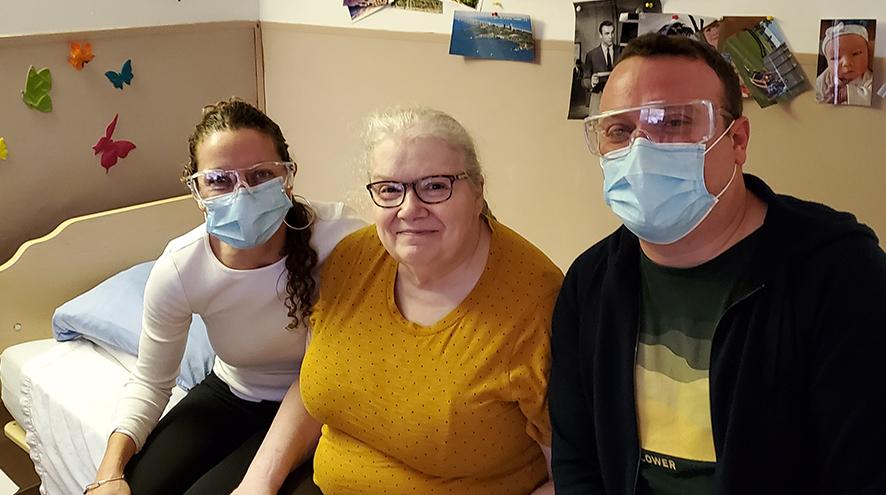Changing the future: Naomi Mison
Meet one of the British Columbians sharing their stories as part of Alzheimer's Awareness Month 2021.

January is Alzheimer’s Awareness Month – and, as we start a new year, it’s a great time to think about what we want the future to look like for people living with dementia, for caregivers – and ultimately for everyone! With people living with dementia and their caregivers facing more social isolation than ever in an increasingly uncertain world, we’re doubling down on our efforts to change the future for British Columbians affected by dementia. This year, people across the province are sharing their experiences and hopes for the future – people like Naomi Mison of Kelowna.
Naomi talks about the challenge of supporting her mother Frances, who is living with dementia in long-term care in Alberta, during the pandemic: “You can’t provide the level of care needed when you are unable to access their room,” she says. Caregiving at a distance was complicated enough without the additional obstacles presented by lockdown.
Frances was 53 and living in England when Naomi and her brother Nathan first noticed changes. Frances was beginning to experience delusions, which prompted her children to move her back to Canada, specifically Alberta, to be closer to the family. After several unsuccessful attempts to access support, she was eventually assessed by a crisis team, who determined that she should be hospitalized. She was initially treated her for bipolar disorder before a brain scan showed signs of atrophy and Frances received a diagnosis of frontotemporal dementia (FTD).
“It was definitely shocking,” says Naomi, who was in her early twenties when Frances received the diagnosis. “We’d never imagined the issue was going to turn out to be cognitive impairment – she was too young!” Naomi and her brother were faced with making difficult decisions for their mother without having time to process what was happening. Frances was already at the point of needing more care than either of them could provide at home, so she moved into long-term care.
Naomi – who later moved to B.C. – is already well-acquainted with the challenges of being a long-distance caregiver. She was flying out to see her mother every two or three months before the pandemic began and was on her way to Alberta for another visit when the facility went into lockdown, banning all non-essential visitors from entering. “There was not enough PPE at the facility, so I didn’t get a chance to hug her, and it wasn’t clear when I would get another chance.”
COVID-19 changed things for Naomi and her family. Naomi made the best of a complicated situation and found creative solutions to stay connected with Frances. Naomi bought her mom a tablet so they could do video calls and make sure to see each other. She used Skip the Dishes to order her mother foods she enjoys, like ginger beef. And Frances loves to read, so there are frequent orders placed to Amazon. While they had an outdoor visit in June, her mother wasn’t comfortable, and they weren’t able to get close.
Finally, in August, Naomi received essential visitor status and, with protective gear in place, was able to hug her mother for the first time since the previous holiday season. “I did not realize how important touch was until it was no longer possible,” she says.
In the first week of October, Naomi was lucky enough to be permitted entrance to her mother’s room to celebrate her birthday. She wanted to enjoy the visit but had to focus on taking care of necessities – getting rid of old clothes, changing batteries, exchanging books – things she hadn’t been able to do for eight months.
Unfortunately, an outbreak of COVID-19 was declared at Frances’s care home on October 22, and they went into another lockdown. Over a hundred staff members and 62 residents tested positive, including Frances. It was a tense and surreal two weeks while Frances was in quarantine. “I was at work one day and the home called to ask me to encourage her to stay in her room, because she’d become restless. They are struggling to cope with so many staff in isolation.”
Frances’ case has been declared resolved, but that doesn’t change the underlying pressures of the experience, for Naomi and other caregivers who must navigate complicated guidelines and situations in order to care for the people living with dementia in their lives. “People living in long-term care feel alone and may not understand why their loved ones aren’t coming around to visit. You can explain the circumstance and why you are not able to visit, but it is difficult for them to comprehend and it doesn’t negate the feelings of loneliness. The prolonged periods of isolation are negatively impacting people’s symptoms, and in some cases, causing a further decline in their condition.”
Read more stories
Learn more about the experiences of British Columbians affected by dementia and help us change the conversation – and the future! – for families on the journey.
